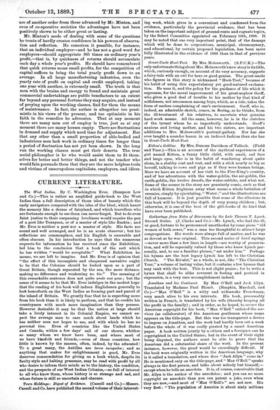CURRENT LITERATURE.
The West Indies. By C. Washington Eves. (Sampson Low and Co.)—This is rather an amplified guide-book to the West Indies than a full description of those isles of beauty which the early navigators compared with the isles of the blest, which haunt the memory like a dream of fairyland, and which travellers who are fortunate enough to see them can never forget. But to do even faint justice to their surpassing loveliness would require the pen of a poet like Tennyson, or of a master of style like Ruskin ; and Mr. Eves is neither a poet nor a master of style. His facts are sound and well arranged, and he is an acute observer ; but his reflections are commonplace, and his English is execrable and often obscure. In his introduction he says that the numerous requests for information he has received since the Exhibition, led him to the conclusion that a book of the sort which he has written "would be acceptable." What Exhibition he means, we are left to imagine. And Mr. Eves is of opinion that "the effect of this incomplete and chequered narrative ought to be that the Colonies should be looked upon as a part of Great Britain, though separated by the sea, the mere distance making no difference and weakening no tie." The meaning of this remarkable sentence does not quite saute aux 1/ear; but the sense of it seems to be that Mr. Eves indulges in the modest hope that the reading of his book will induce Englishmen generally to look henceforth on the West Indies as forming part and parcel of the island of Britain. We greatly fear that he is expecting more from his book than it is likely to perform, and that he credits his countrymen with much more imagination than they possess. However desirable it may be that the nation at large should take a lively interest in its Colonial Empire, we cannot ex- pect the average man to care much about lands which he has neither seen nor hopes to see, and with which he has no personal ties. Even of countries like the United States and Canada, within a few days' sail of our shores, whither so many whom we know have been, and where most of us have kinsfolk and friends,—even of these countries, how little is known by the masses, often, indeed, by the educated ! To a great many, the Antilles are terns incognita3; and as anything that makes for enlightenment is good, Mr. Eves deserves commendation for giving us a book which, despite its faulty style and halting grammar, may be read with profit by all who desire to inform their minds as to the history, the condition, and the prospects of our West Indian Colonies,—so full of interest to all who know them, whose history is so strange and sad, and whose future is still so uncertain and obscure.


















































 Previous page
Previous page